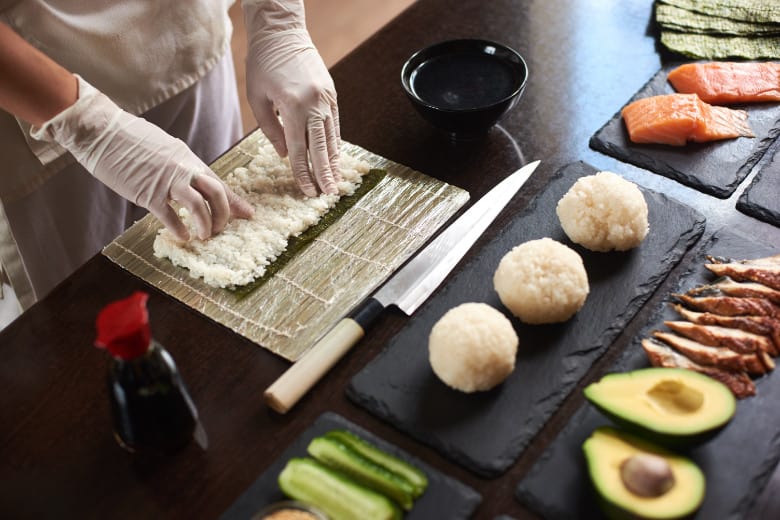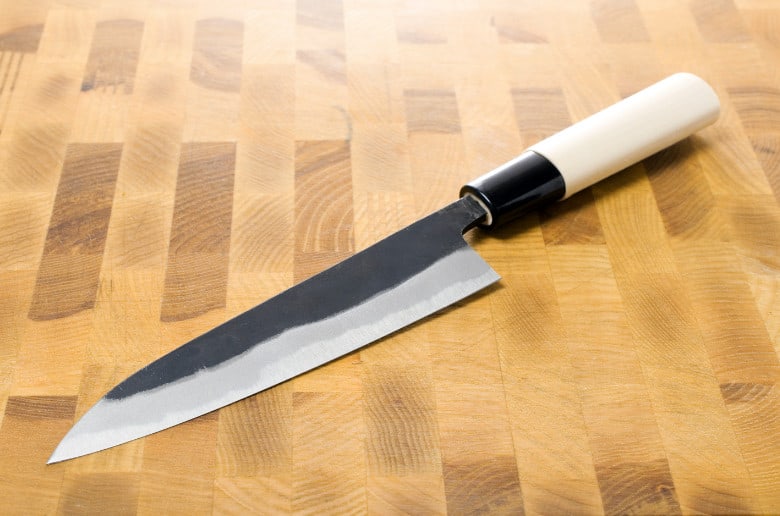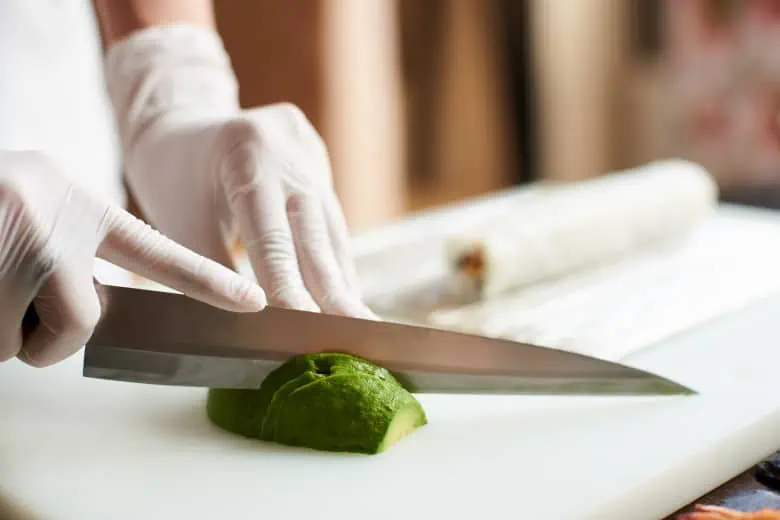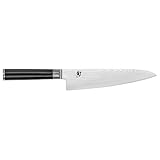Have you ever heard of a gyuto knife? It’s the Japanese version of a Western chef’s knife but with some subtle differences. Japanese-style knives have really become popular recently, especially santoku and nakiri knives. Today we’re focusing on the gyuto.
Derived from traditional Japanese craftsmanship, gyuto knives are known for their extremely sharp edge and lightweight design. The thin blade allows for clean, precise cuts, while the overall balance of the knife reduces hand fatigue during extended use.
When considering a gyuto knife, it’s essential to pay attention to blade material, size, and handle construction. High-quality steel will provide the razor-sharp edge and long-lasting durability you need, while the size of the knife should match your personal preferences and cutting habits. The handle should be comfortable, ensuring a secure grip during use.
With so many gyuto knives available on the market, finding the perfect match can be hard. That’s why I’ve spent countless hours researching and testing the best gyuto knives, narrowing it down to some top picks I think you’ll love.

My Picks For Best Gyuto Knives
Let’s take a look at some of my favorites.
MITSUMOTO SAKARI 8-inch Gyuto Chef Knife
If you’re searching for a top-notch gyuto chef knife, the MITSUMOTO SAKARI 8-inch Knife should definitely be on your radar.
I’ve had the pleasure of using this knife in my kitchen recently, and I can confidently say that it performs just as impressively as it looks…and it looks good! The top 440C Damascus steel blade, crafted with Japanese samurai sword forging techniques, has the perfect balance of toughness and hardness.
The precious maple wood handle is not only aesthetically stunning, but it also offers an ergonomic, comfortable grip. This knife makes even the most tedious slicing tasks feel effortless, allowing me to enjoy every moment spent in the kitchen.
Although the price may be a bit steep for some, the high-quality blade and collectible design make this knife a worthy investment. Just remember to treat it with care, as it requires handwashing and regular maintenance to preserve its incredible performance for years to come.
Pros
Cons
Tojiro DP Gyutou 8.2 Inch Knife
The Tojiro DP Gyutou 8.2″ Knife is a high-quality Japanese knife that offers excellent value compared to other high-end knives on the market. It features a VG-10 core, which is comparable to some of the more expensive Shun knives. The blade is made in Japan and is incredibly sharp and precise, making it easy to slice through even the thinnest pieces of fish or vegetables. The blade is made of high-quality stainless steel, and it feels very durable and well-made in the hand.
The ergonomic handle is comfortable to grip and provides a secure hold during use. The knife fits very well in small to medium-sized hands. Some users have noted that the knife needed a hint of refinement around the heel and spine to smooth out some sharp edges. One user noted that the knife is quite heavy, which may be a con for some individuals.
Overall, the Tojiro DP Gyutou 8.2″ Knife is an excellent choice for anyone looking for a high-quality Japanese knife at a reasonable price. It is incredibly sharp and precise, and the durable construction ensures that it will last for many years with proper care. The ergonomic handle provides a comfortable grip, and the knife is well-balanced, making it easy to use for extended periods of time.
Pros
Cons
Yoshihiro VG-10 Hammered Damascus Gyuto Knife
I highly recommend this Yoshihiro Gyuto knife for its stunning craftsmanship, versatility, and excellent performance in the kitchen.
Upon unboxing my Yoshihiro VG-10 Hammered Damascus Gyuto knife, I couldn’t help but marvel at its beauty. The 46 layers of steel forged into a stunning pattern not only make this knife a piece of art but also enhance its functionality by preventing food from sticking to the blade.
As a versatile chef’s knife, this Gyuto has become my go-to tool for all kinds of kitchen tasks. From dicing vegetables to carving roast chicken, the curved blade allows for smooth rocking and quick chopping. The Octagonal Ambrosia handle fits my hand perfectly and feels comfortable even during extended use.
One thing to keep in mind with this knife is the extra care it requires. It’s essential to sharpen and hone the blade with only water whetstones and to handwash and dry immediately after use, especially if using acidic ingredients. Also, avoid using this knife on hard materials like bones, nutshells, or frozen foods. With proper care and maintenance, this Yoshihiro Gyuto knife should prove to be a fantastic long-term investment in your kitchen arsenal.
Pros
Cons
Sakai Takayuki Hammered Damascus Gyuto 240mm Chef Knife
If you need a durable and sharp chef knife, the Sakai Takayuki Hammered Damascus Gyuto is another excellent choice.
The moment I picked up the Sakai Takayuki Hammered Damascus Gyuto, I knew I was holding a high-quality Japanese chef knife. The 33 layers of Damascus hammered stainless steel made it stand out visually, and the VG10 alloy core ensured a sharp, precise cutting experience. The 24 cm (9.5 inches) long blade felt a bit unwieldy until I got used to the extra length.
Handling the knife was a pleasure, as the desertwood handle offered a comfortable and secure grip. I’ve used it for dicing, slicing, and chopping, and it performed admirably in each task.
As with any high-quality knife, proper maintenance is necessary to keep the blade in top condition, so don’t forget to sharpen and clean it regularly. Overall, the Sakai Takayuki Hammered Damascus Gyuto is an excellent addition to any kitchen, providing a sharp, reliable cutting tool that is both beautiful and functional.
Pros
Cons
Yoshihiro Ice Hardened Stainless Steel Wa Gyuto Chef Knife (8.25″)
After using the Yoshihiro Ice Hardened Stainless Steel Wa Gyuto Chef Knife for various chopping tasks, I can confidently say that it’s a high-quality knife. The blade is impressively sharp and made from high-carbon Aus-8 stainless steel. This steel type, combined with the knife’s ice-hardening process, results in an exceptional balance of sharpness and durability.
The knife is quite versatile, perfect for cutting meat, fish, and vegetables. It has a curved, double-edged blade that glides smoothly while chopping, making my kitchen tasks more efficient. I also appreciate how incredibly lightweight this knife is, with an ergonomically crafted octagonal handle that fits snugly in my hand.
The included protective wooden sheath adds a nice touch to its overall appearance and helps keep the knife safe when not in use. If you’re searching for a top-notch gyuto knife, the Yoshihiro Ice Hardened Stainless Steel Wa Gyuto Chef Knife is an excellent choice.
Pros
Cons
Shun Cutlery Classic Asian Cook’s Knife 7”, Gyuto-Style Chef’s Knife
I’ve owned Shun knives for years and they never disappoint. The Shun Cutlery Classic Asian Cook’s Knife is another winner that is ideal for all-around food prep. This knife is made with a 7-inch blade that is thin and lightweight, making it perfect for a full range of chopping, slicing, and dicing tasks. The blade is made with a proprietary VG-MAX cutting core that is wear and corrosion-resistant, strong, and very fine-grained, enabling a scary-sharp, long-lasting 16° edge.
The blade is clad on each side with 34 layers of stainless Damascus, totaling 68 layers, which support the core, add stain resistance, and help food release from the blade. The handle is made of durable, beautiful, and bacteria-resistant D-shaped ebony-finished Pakkawood, which is comfortable for both left- and right-handed users. The full composite tang provides light weight and perfect balance, making this knife easy to handle and control.
The Shun Cutlery Classic Asian Cook’s Knife is a versatile and reliable tool that is perfect for professional chefs and home cooks alike. It is an all-purpose knife that excels in the kitchen, allowing you to prepare a wide range of foods with precision and ease. With its high-quality materials, expert craftsmanship, and classic design, it is sure to become one of your favorite kitchen knives.
Pros
Cons
Related: 5 Easy Methods For How To Sharpen A Knife
Buying Guide
Like a Western chef’s knife, a gyuto knife is exceptionally versatile and can be used for all different styles of cutting, from meat to vegetables to tiny pieces of garlic. When comparing a gyuto knife to a chef’s knife, the main difference is the blade profile. A chef’s knife has a thicker blade profile, which makes it better suited for heavier tasks, whereas the gyuto has more precision.
Here are some features to consider when shopping for gyuto knives:
Blade Length
Gyuto knives usually have a longer blade than most knives, usually between 8- and 12 inches. This extra length makes the gyuto knife perfect for slicing larger foodstuffs. However, it is important to consider your own preferences and the tasks you will be using the knife for when choosing the blade length. Most home cooks prefer an 8-inch length.

Blade Profile
A gyuto has a thinner blade profile than a regular chef’s knife. At 5mm thickness, slicing ingredients without a tear or other damage with a chef’s knife requires an incredibly sharp edge. Even if a gyuto isn’t as sharp as a chef’s knife, it will tackle this much easier with its slender profile and the acute grinding angle. This makes it easier to slice through ingredients with precision.
Edge
Due to its Western influence, most modern gyuto knives will typically have a double-beveled edge, unlike many traditional Japanese models. This means that the blade is sharpened on both sides, which makes it easier to use for those who are used to using a Western knife.
Handle
The handle of a gyuto knife is typically made of wood or synthetic materials. It is important to choose a handle that is comfortable to hold and provides a good grip. In some cases, handles are designed specifically for right or left-handed use.
Material
Gyuto knives are typically made of high-quality stainless steel, which is known for its durability and resistance to corrosion. Some knives may also be made of carbon steel, which is known for its sharpness and edge retention. However, carbon steel requires more maintenance than stainless steel.

Price
The price of a gyuto knife can vary widely depending on the quality of the materials used and the craftsmanship involved in making the knife. It is important to choose a knife that fits within your budget while still meeting your needs. I’ve seen them range from under $50 to well over $500. In my opinion, the sweet spot is between $100 – $200 for the best bang for the buck.
Related: Kitchen Knife Buyer’s Guide: Tips For The Perfect Choice
Conclusion
A gyotu is an excellent multipurpose knife that can satisfy most of your kitchen cutting needs, much like a chef’s knife. It strikes the perfect balance between the design profile of a chef’s knife and the precision of a santoku. When purchasing a gyuto knife, it’s crucial to consider the blade material, length, shape, handle material, weight, and price.
While all six knives in the article are excellent choices, the Tojiro DP Gyutou 8.2 Inch Knife and Yoshihiro VG-10 Hammered Damascus Gyuto Knife are my personal favorites.






